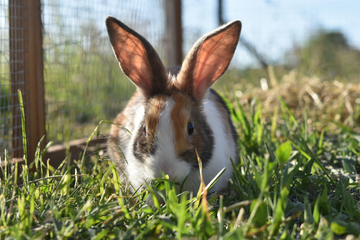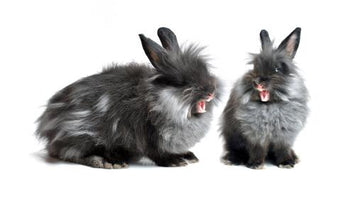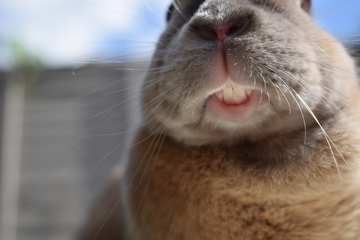Signs of Rabbit Health: What You Should Know
Rabbits are experts at hiding when they feel unwell. It's part of their survival instinct. But for rabbit owners, this trait means paying close attention to the little things. Subtle changes in behavior or physical appearance can often be the first signs that something's not right.
Click Here For a Beginners Guide to Rabbit Care.

So, how do you stay ahead of the curve? Learning the key signs of rabbit health and knowing what to look for daily. It's all about observation, consistency, and creating a home environment that supports your rabbit's natural needs.
Physical Signs of a Healthy Rabbit
A healthy rabbit has a certain sparkle. It's in the way they move, how their coat shines, and the energy they bring to everyday activity. While every bunny is unique, there are a few physical cues that can help you determine if yours is in good shape.
Bright, Clear Eyes
The eyes of a healthy rabbit should be alert, bright, and completely free of discharge. Any crusting, excessive tearing, or redness could signal a respiratory infection or even a dental problem since rabbit teeth are closely connected to their eye sockets. Regularly check for cloudiness or swelling as well.
If you're interested in how rabbits see the world, this blog on rabbit vision breaks it down beautifully.
Clean, Dry Nose
Another key feature of the face is the nose. It should be dry and clean. A runny nose or frequent sneezing may mean allergies, an upper respiratory infection, or even dental issues affecting the sinuses. Rabbits don't get "colds" like humans do, but Pasteurella and other bacteria can cause respiratory symptoms that require vet care.
Smooth, Shiny Coat
That soft, plush fur isn't just for cuddles—it's also a good indicator of health. A healthy coat should be shiny, even, and well-maintained. Rabbits groom themselves constantly, so if their fur is dull, patchy, or matted, it may mean something is off.
Some shedding is normal during molting seasons. Still, large bald patches or flaky skin might point to mites, ringworm, or hormonal imbalances. Groom your rabbit regularly and watch for changes in their coat.
Consistent, Healthy Weight
Being underweight or overweight can cause health issues in rabbits. You should be able to feel your rabbit's ribs under a light layer of flesh, but they shouldn't feel bony. Conversely, if their ribs are buried under layers of fat, they're likely overweight.
Sudden weight loss or gain can be a sign of illness, dental issues, or changes in appetite. Monitoring their weight weekly using a kitchen scale is a helpful habit. If something seems off, don't wait—reach out to your rabbit-savvy vet.
Normal Urine and Feces
Healthy poop says a lot. Rabbits should produce round, firm droppings consistently. Anything soft, small, misshapen, or mushy is a red flag. Cecotropes—those softer, smelly droppings—are also important. Still, the rabbit should usually eat them directly from the source. If you find uneaten cecotropes in the litter box or on their fur, their diet or digestion might be off.
Urine should be pale yellow and clear. Milky, gritty urine may signal too much calcium, while red or orange urine could be from vegetable pigments—or, in rare cases, blood. Keep a close eye on these changes.
Active and Alert Behavior
Healthy rabbits don't just sit around. They explore. They jump up when they hear you coming. They investigate their toys and surroundings. If your rabbit is lying down more than usual or seems disinterested in playtime, it's worth paying attention.
Check out our breakdown of why bunnies sometimes hide—it might offer some insight into their mood and energy levels.
Clean Ears
Rabbit ears should be free of waxy buildup, dirt, or unpleasant odor. A strong smell or visible debris could mean an ear infection or ear mites. Floppy-eared breeds are especially prone to issues since their ears don't ventilate as well.
Healthy Teeth and Gums
Rabbits' teeth grow continuously throughout their lives. If their teeth aren't worn down properly by chewing hay or wood-based toys, they can overgrow and cause severe problems—like abscesses, difficulty eating, or eye issues.
Teeth should be even and not visibly protruding. Gums should be pink, not red or pale, and free from swelling. For a closer look at what healthy teeth should look like, read through our guide on dental care in rabbits.
Signs of Rabbit Health in Behavior
While physical signs are important, a rabbit's behavior often gives away even earlier clues. Once you understand what's "normal" for your rabbit, you'll be better equipped to spot when something is off.
Steady Appetite and Hydration
A rabbit that's eating and drinking normally is usually a healthy one. But a sudden drop in appetite can be a red flag—especially regarding hay. Rabbits can go into GI stasis quickly, so any lack of food or water should be addressed immediately.
Keep an eye on how much water they drink, especially in warmer months. Dehydration can sneak up fast.
Regular Grooming
Healthy rabbits are meticulous groomers. They'll spend time cleaning their fur, ears, and face each day. If your rabbit suddenly stops grooming or you notice their fur looks messy or unkempt, it could indicate they're feeling ill or in pain.
Social Behavior and Personality
Rabbits each have their own unique personalities. Some are shy, others are bold. But a sudden change—like becoming withdrawn or aggressive—might be cause for concern. A healthy rabbit will generally be responsive and affectionate (on their terms) and enjoy interacting with their humans or fellow bunny companions.
7 Tips to Maintain Signs of Rabbit Health
Knowing what signs to look for is just part of the equation. Creating an environment that supports those healthy habits is the other half. Here are some tips to keep your rabbit in tip-top shape.
1. Feed a High-Fiber, Hay-Based Diet
Hay isn't just food—it's vital to your rabbit's digestive and dental health. Make sure hay is always available. The best options include Timothy hay, orchard grass, or meadow hay. Supplement daily with leafy greens and provide a small amount of quality pellets.
2. Encourage Daily Exercise
Rabbits need room to move! Daily free-roaming time outside of their enclosure is essential. Set up a bunny-proof area where they can hop, stretch, and zoom to their heart's content. This movement helps maintain muscle tone, prevent obesity, and improve mood.
3. Prioritize Cleanliness
Dirty environments can quickly lead to health problems. Make sure to clean your rabbit's litter box daily, replace bedding often, and sanitize food and water dishes regularly. Keeping their enclosure clean reduces the risk of respiratory issues and infections.
4. Keep Up With Vet Visits
Don't wait until something goes wrong. Annual checkups help catch small issues before they turn into big problems. Many vets specializing in exotics recommend at least one visit yearly and more if your rabbit has ongoing medical concerns.
5. Watch for Early Warning Signs
Knowing what's normal for your rabbit makes it easier to catch problems early. Keep a journal if needed—track their weight, appetite, water intake, and even behavioral quirks. This baseline can help your vet if something changes suddenly.
6. Provide Enrichment and Mental Stimulation
Rabbits are smart and easily bored. Toys, tunnels, cardboard boxes, digging pits, and hidey houses keep them mentally engaged. Rotate their toys weekly to keep things fresh and spend time interacting with them each day.
7. Focus on Dental Health
Chewing isn't just a pastime—it's a necessity. Offer wooden chew toys, untreated apple branches, cardboard, and lots of hay to support dental wear. Without regular chewing, rabbit teeth can grow out of control and lead to severe pain.
Keeping Your Rabbit Happy and Healthy
Every rabbit is different, but the signs of rabbit health are surprisingly consistent once you know what to look for. Bright eyes, a shiny coat, good eating habits, and active behavior all paint the picture of a thriving rabbit.

Combining keen observation with regular care and a safe, enriched environment sets your rabbit up for a long and joyful life. Prevention is easier—and far less stressful—than treatment. Stay informed, stay prepared, and trust your instincts.
And remember: if you're ever unsure whether something is normal, it's always a good idea to contact your rabbit-savvy vet.
Key Takeaways
Recognize the physical and behavioral signs of rabbit health, such as bright eyes, a shiny coat, consistent eating, and alertness.
Create a healthy environment through proper diet, exercise, hygiene, and mental stimulation.
Use regular vet visits and personal observation to catch potential issues early before they escalate.
Why Knowing the Signs of Rabbit Health Matters
Rabbits don't yelp when they're hurt. They won't whine or cry like a dog might. Instead, they go quiet. It's not because they aren't in pain—they're prey animals. In the wild, showing weakness makes them a target. So, when your rabbit isn't feeling well, they'll often try to act normal until they can't hide it anymore.
This is why understanding the signs of rabbit health isn't just helpful—it's essential. The earlier you catch changes in your rabbit's behavior or body, the better the outcome. Whether it's GI stasis, dental problems, or an underlying infection, early detection can mean the difference between a quick recovery and a serious medical issue.
How Long Can Rabbits Hide Symptoms?
In some cases, rabbits can hide symptoms for days. During this time, their condition may worsen, sometimes rapidly. For example, with GI stasis, a rabbit might seem a little quiet at first. But within 24 hours, they could become lethargic, stop eating altogether, and face a life-threatening situation.
This is why even minor signs—like smaller droppings or subtle changes in how they interact with you—should never be brushed off. Rabbits are routine-oriented animals. Deviations from their norm are worth noting.
Tracking Health Through Routine
One of the best ways to monitor signs of rabbit health is by establishing a daily routine. When you feed, clean, and interact with your rabbit at the same times every day, you start to notice the little things. Maybe their water bowl is still full when it's usually half-empty by noon. Or they're spending more time than usual inside their hidey house.
These patterns are valuable. They help you spot issues before they escalate. And they also help your vet should you need to call in for support. Consistent habits lead to clearer signals when something's wrong.
When to Call the Vet
No one wants to rush to the vet over nothing. But with rabbits, hesitation can be risky. Knowing when to call your vet is just as important as recognizing signs of rabbit health in the first place.
Not eating or drinking for 6–12 hours: This is a red flag and may signal GI stasis.
Droppings are very small, misshapen, or missing: This may also be a sign of digestive slowdown.
Lethargy or unusual hiding behavior: If your normally active rabbit won't move or respond, it's time to call.
Labored breathing, nasal discharge, or sneezing fits: These could indicate a respiratory infection.
Drooling, difficulty chewing, or wet chin fur: These are classic signs of dental issues.
Head tilt, imbalance, or rolling: These may be neurological and require urgent care.
It's always better to check in with a vet and have it be nothing than to wait too long and regret it. If you don't yet have a rabbit-experienced vet, use our vet locator tool to find one near you.
Common Rabbit Health Myths (And What to Know Instead)
There's a lot of information about rabbit care—but not all of it's accurate. Let's clear up a few common myths that could get in the way of spotting true signs of rabbit health.
Myth: "My rabbit is eating pellets, so they must be healthy."
Pellets are part of a rabbit's diet but should make up a small portion. A rabbit eating pellets while refusing hay might show early signs of dental pain or digestive imbalance. Hay is the most important part of a rabbit's diet—not the extras.
Myth: "Rabbits don't need vet visits unless sick."
Rabbits should see a vet at least once a year, even if they seem healthy. Preventative care, weight checks, and dental exams can prevent small problems from turning serious. Regular vet visits are a key part of proactive rabbit health care.
Myth: "Red urine means my rabbit is bleeding."
It's easy to panic when you see red in the litter box. But often, this is from plant pigments in veggies like carrots or dandelion greens. True blood in the urine looks cloudy or clotty. If you're unsure, it's best to bring a sample to your vet for testing.
Signs of Rabbit Health in Different Life Stages
What's normal for a young rabbit might look very different for a senior. As your rabbit ages, the signs of rabbit health change slightly. Here's what to watch for at each stage of life.
Young Rabbits (Under 1 Year)
Baby bunnies are full of energy. You'll notice zoomies, binkies, and a serious curiosity streak. At this age, growth and development are top priorities. Make sure they're eating lots of hay and adjusting well to greens. Watch for early dental alignment issues and litter training progress.
Adult Rabbits (1–6 Years)
This is the prime of your rabbit's life. You'll notice regular habits, a consistent appetite, and a strong sense of territory. Keep up with regular exercise, social time, and preventative vet care. During this stage, maintaining a healthy weight and strong dental habits is essential.
Senior Rabbits (6+ Years)
Older rabbits may slow down a little. They might nap more or show signs of arthritis. Regular grooming becomes more important since they might not be as flexible. Keep an eye on weight loss, subtle changes in appetite, and litter box habits, which can shift with age.
Soft flooring, extra bedding, and easy-access litter boxes can help support their changing needs. And don't forget to keep offering enrichment—mental stimulation is just as important in their golden years.
How to Build a Rabbit Health Checklist
Want to stay organized? Build a simple weekly checklist. This makes keeping tabs on your rabbit's health easier without second-guessing yourself. Here's a sample layout to get you started:
Check eyes, ears, and nose for discharge or irritation
Feel along their body to check for lumps, injuries, or swelling
Monitor droppings and urine color daily
Weigh your rabbit once a week and log it
Inspect their nails and fur during grooming sessions
Track appetite—hay, greens, water, and pellet intake
Note changes in behavior or social interaction
Over time, these small habits become second nature. You'll start to spot things early and feel more confident knowing you're staying ahead of the game.

Conclusion: Stay Informed, Stay Connected
Your rabbit depends on you to read the signs they can't say out loud. By learning the common signs of rabbit health—and what deviations might mean—you'll be better prepared to support them through every life stage. Whether it's a routine grooming session or a quick check of their litter box, these everyday moments are your chance to protect your rabbit's well-being.
Don't underestimate your intuition as a rabbit owner. If something feels "off," trust that feeling and investigate. Combined with consistent care, enrichment, and vet partnerships, your rabbit has everything they need to thrive.
For more tips on rabbit nutrition, habits, and housing, explore our full collection of rabbit care guides and blogs. Keeping your rabbit healthy is a journey—and we're here to help every hop of the way.

Rabbit Is It Low Maintenance or More Work Than You Think?

Decoding Bunny Behavior: Understanding Rabbit Mood










